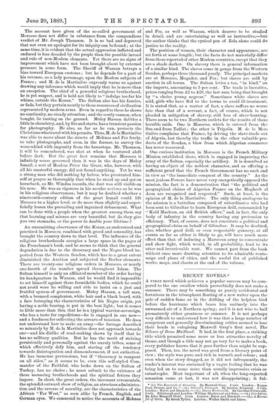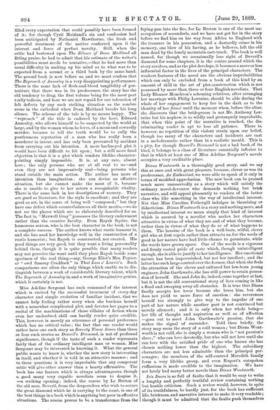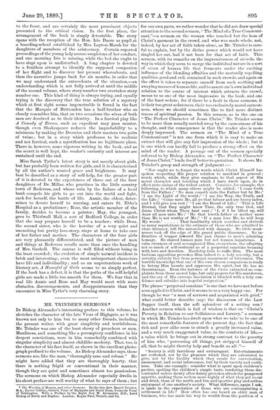RECENT NOVELS.* A FIRST novel which achieves a popular success
may be com- pared to the one swallow which proverbially does not make a. summer. There may be something as purely accidental an& fortuitous in the triumphant floating of a new writer upon the gale of sudden fame as in the drifting of the helpless bird before the hurricane which bears him untimely into the unwarmed air of a Northern spring; and it is not wise to hail prematurely either greatness or summer. It is not perhaps very difficult to understand how it was that a large number of competent and generally discriminating critics seemed to lose their heads in eulogising Maxwell Gray's first novel, The Silence of Dean Maitland. It had, in the first place, a striking title which promised some more or less attractive novelty of theme, and though a title may not go very far to make a book, every publisher knows that it goes further than might be sup- posed. Then, too, the novel was good from a literary point of view ; the style was pure, and rich in warmth and colour ; and even when the story dragged, as it did not infrequently, the reader's interest was sustained by a vague feeling that he wag being led on to some more than usually impressive crisis or catastrophe. Most important of all, when the long-expecteds sensation came at last, it was not disappointing ; it fnl- • (1.) The Reproach of Annesley. By Maxwell Gray. 3 vols. London : Kegan Paul, Trench, and Co.—(2.) Deveril's Diamond. By Adeline Sergeant 3 vols.. London : Hurst and Blackett.—(3.) Diana Wentworth. By Caroline Fothergill.. S vols. Edinburgh and London : William Blackwood and Bona.—(4.) Iris riaCte, By Alice Mangold Diehl. 2 vols. London : Hurst and Blackett.—(5.) A House,- ful of Girls. By Sarah Tyner. London : Walter Smith and Linea.
filled every expectation that could possibly have been formed of it; for though Cyril Maitland's sin and confession had been anticipated by Nathaniel Hawthorne, the fresh and powerful treatment of the motive conferred upon it the interest and force of perfect novelty. Still, when the critic had bestowed upon The Silence of Dean Maitland all fitting praise, he had to admit that his estimate of the writer's possibilities must needs be tentative,—that he had more than usual difficulty in making up his mind as to what was to be expected from a second or a third book by the same hand. The gecond book is now before us, and we must confess that The Reproach of Annesley is a very disappointing performance. There is the same lack of flesh-and-blood tangibility of por- traiture that there was in its predecessor, the story has the old tendency to drag, the first volume being for the most part really tedious, and here we are not repaid for our toleration of felt defects by any such striking situation as the sombre scene in the cathedral when Dean Maitland breaks his long silence. The scheme of the tale is by no means happy. The " reproach " of the title is endured by the hero, Edward Annesley, who allows himself to be suspected by the world at large, and by the woman whom he loves, of a mean and cowardly murder, because to tell the truth would be to sully the posthumous reputation of a man who has really been a murderer in intent, and has only been prevented by accident from carrying out his intention. A more hackneyed plot it would have been difficult to hit upon ; but a still more fatal objection is that it is a plot which renders lifelike character- painting simply impossible. It is, at any rate, absent here ; the only persons who are at all real to us—and even they are not impressively real—being persons who stand outside the main action. The author has more of invention than imagination : she can devise an effective situation, but she cannot make the most of it, because she is unable to give to her actors a recognisable vitality. There is the same lack in her descriptions of scenery. They are good as literature, for the style is excellent ; and they are good as art, in the sense of being well " composed ;" but they have one defect which counterbalances all their merits,—we do not see the places which are so elaborately described for us. The fact is, "Maxwell Gray" possesses the literary endowment rather than the creative faculty. Even Raysh Squire, the humorous sexton, who is the best character in the book, is not a complete success. The author knows what rustic humour is, and she has used her knowledge well in the construction of a rustic humorist; but Raysh is constructed, not created. His good things are very good, but they want a living personality behind them, though it is quite possible that many readers may not perceive the want until they place Raysh beside some specimen of the real thing,—say, George Eliot's Mrs. Poyseri or " owd Sammy Craddock" in That Lass o' Lowrie's. Such comparisons are often the only things which enable us to dis- tinguish between a work of considerable literary talent, which The Reproach of Annesley is, and a work of imaginative genius, which it certainly is not.
Miss Adeline Sergeant has such command of the interest which is excited by the successful treatment of every-day character and simple evolution of familiar incident, that we cannot help feeling rather sorry when she burdens herself with a somewhat complicated plot, and devotes her pages to a recital of the machinations of those villains of fiction whom even her undoubted skill can hardly render quite credible. This, however, is merely an utterance of personal preference which has no critical value ; the fact that one reader would rather have one such story as Seventy Times Seven than three or four such stories as Deveril's Diamond, is not of profound significance, though if the taste of such a reader represents fairly that of the ordinary intelligent man or woman, Miss Sergeant may be interested in knowing it. What the general public wants to know is, whether the new story is interesting in itself, and whether it is told in an attractive manner ; and to these questions it is very improbable that any competent critic will give other answer than a hearty affirmative. The book has one feature which is always advantageous, though a good many very capable novelists seem to despise it, —a striking opening ; indeed, the rescue by Le Breton of the old man, Deveril, from the desperadoes who wish to secure the great diamond which he is carrying to the coast, is one of the best things in a book which is anything but poor in effective situations. The rescue proves to be a transference from the
frying-pan into the fire, for Le Breton is one of the most un- scrupulous of scoundrels, and we have not got far in the story before we find him on his way from Africa to England with the treasure in his possession, and a dastardly crime in his memory, one blow of his having, as he believes, left the old' man dead by the lonely mountain cart-track. The book is welt named, for though we occasionally lose sight of Deveril's diamond for some chapters, it is the centre around which the story revolves, and as the plot develops, it becomes a more or less influential factor in the lives of the principal characters. The weakest features of the novel are the obvious improbabilities which can only be excluded from a book of this kind by an amount of skill in the art of plot-construction which is not possessed by more than three or four English novelists. That Lady Eleanor Monckton's scheming relatives, after arranging, her marriage with Philip Lorraine, should be able during the whole of her engagement to keep her in the dark as to the identity of her fiancé until the moment when, before the altar, she discovers that the bridegroom is not Mr. Anthony Lor- raine but his nephew, is so wildly and grotesquely improbable, that when this point of the narrative is reached, the dis- criminating reader is apt to lose all patience. There is, however, no repetition of this violent strain upon our belief, though too many of the characters and incidents are cast in a melodramatic rather than in a realistic mould. This is a pity, for though Deveril's Diamond is not a bad book of its kind, it belongs to a class of literature essentially inferior to that in which at least one of Miss Adeline Sergeant's novels occupies a very creditable place.
Diana Wentworth is a thoroughly good story, and we say this at once and with great pleasure, because, clever as was its predecessor, An Enthusiast, we were able to speak of it only in terms of modified approbation. The new book can be praised much more unreservedly as a story which will satisfy the ordinary novel-devourer who demands nothing but brisk narrative, and will appeal pleasantly to readers of the better class who like something in the way of intellectual interest. Not that Miss Caroline Fothergill indulges in theorising or didacticism. Diana Wentworth is a story and nothing more, and by intellectual interest we mean simply that kind of interest which is secured by a novelist who makes her characters attractive in virtue of what they are and of what they become, rather than in virtue of what they do or of what happens to them. The heroine of the book is a well-born, wilful, clever girl who at first repels rather than attracts us, for the seeds of good in her nature have had little chance to germinate, while the weeds have grown apace. One of the weeds is a vigorous and firmly rooted pride of caste which, though unintelligent enough, she is able to justify to her intelligence. Her emotional nature has been impoverished, but not her intellect; and the latter has such large control over the former, that when she feels the attraction of the clever and cultured but low-born young engineer, John Garthwaite, she has still power to retain posses- sion of herself. She and John do, indeed, come together at last, but it is not the old conventional story of love coming in like a flood and sweeping away all obstacles. It is true that Diana finally accepts her lover because she loves him, but she does not yield to mere force of emotion : she reverences herself too strongly to give way to the impulse of one part of her nature while another part is not convinced but merely silenced ; and it is only when her whole being— her life of thought and aspiration as well as of affection —goes out to meet John Garthwaite's passion, that she makes the signal of surrender. Told thus briefly, the story may seem the story of a cold woman ; but Diana Went- worth is not cold, she is simply a woman who is " not passion's slave ;" who can love devotedly, but who will not love until she can love with the satisfied pride of one who knows she has chosen nothing lower than the highest. The subsidiary characters are not less admirable than the principal per- sonages ; the members of the self-centred Meredith family form a very lifelike group, and even Rupert's outspoken ruffianism is made credible to the imagination. We have not lately had many better novels than Diana Wentworth.
Iris Dacre is so full of faults that it would be easy to write a lengthy and perfectly truthful review containing nothing but hostile criticism. Such a review would, however, in spite of its truthfulness, be hardly just, for the book has sufficient life, briskness, and narrative interest to make it very readable; though it must be admitted that the faults push themselves to the front, and are certainly the most prominent objects presented to the critical vision. In the first place, the arrangement of the book is simply detestable. The story opens with the reception of the Hon. Iris Deere as pupil at a boarding-school established by Mrs. Layton-Marsh for the daughters of members of the aristocracy. Certain reported proceedings of the young lady arouse suspicions of her conduct, and one morning Iris is missing, while the bed she ought to have slept upon is undisturbed. A long chapter is devoted to a fruitless attempt to identify the supposed companion of her flight and to discover her present whereabouts, and then the narrative jumps back for six months, in order that we may understand the antecedents of the situation,—an understanding which is not fully arrived at until the middle of the second volume, where story number two overtakes story number one. This kind of thing is always trying, and equally trying is the discovery that the true solution of a mystery which at first sight seems impenetrable is found in the fact that the Marquis of Brittenden has a half-brother who so closely resembles him, that on two occasions the wives of both men are deceived as to their identity. In a farcical play like A Comedy of Errors, such an expedient may pass muster, though even Shakespeare reduces the improbability' to a minimum by making the Dromios and their masters two pairs of twins ; but in a story which professes to be realistic and not farcical, such a mystification has no legitimate place. There is, however, some vigorous writing in the book, and as the secret is well kept, the reader's curiosity and interest are sustained until the end.
Miss Sarah Tytler's latest story is not merely about girls, but has probably been written for girls, and it is characterised by all the author's wonted grace and brightness. It may best be described as a story of self-help, for the greater part of it is devoted to the experiences of three out of the four daughters of Dr. Millar, who practises in the little country town of Redcross, and whose ruin by the failure of a local bank compels his girls to go out into the world and fight, each for herself, the battle of life. Annie, the eldest, deter- mines to devote herself to nursing, and enters St. Ebbe's Hospital as a probationer ; Rose, the artistic member of the family, decides to become a painter; May, the youngest, goes to Thirlwall Hall, a sort of Bedford College, in order that she may prepare herself to be a teacher; while Dora, the second sister, who is the heroine of a very quiet and unexciting but pretty love-story, stays at home to take care of her father and mother. The characters of the four girls are very pleasantly differentiated, and the picture of men and things at Redcross recalls more than once the handling of Mrs. Gaskell. The canvas is well filled without being in the least crowded ; the evolution of simple nataral incident is brisk and interesting ; even the most unimportant characters have life and individuality ; and as an unpretentious work of literary art, A Houseful of Girls seems to us simply perfect. If the book has a defect, it is that the paths of the self-helpful girls are made a little too smooth for them. We fear that in real life Annie and Rose and May would meet with more obstacles, diseouragements, and disappointments than they encounter in Miss Tytler's very charming story.




































 Previous page
Previous page